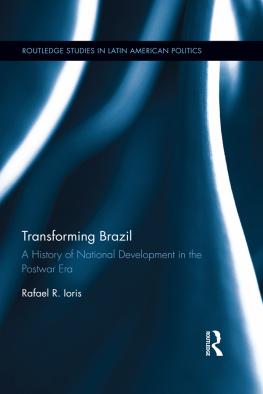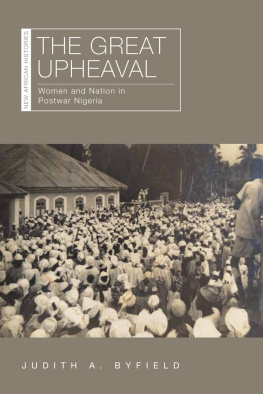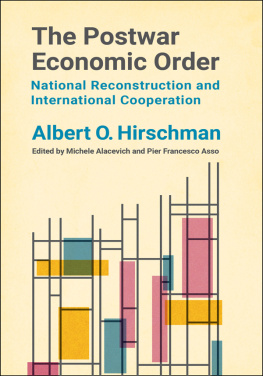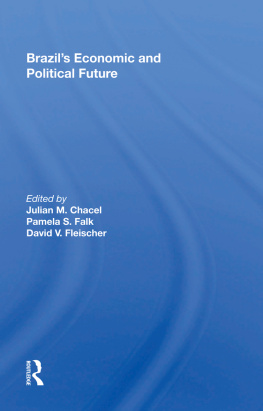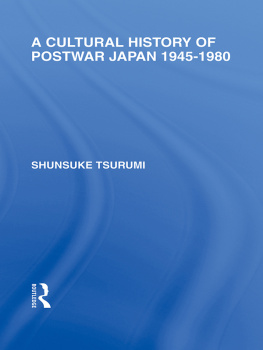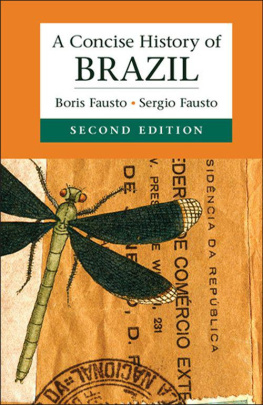This well-researched and engaging study makes a provocative case that Brazilian developmentalism had heretofore unidentified political consequences that shaped the nation throughout the second half of the twentieth century and beyond. Ioris turns the conventional wisdom on its head by locating the origins of the 1964 military coup in the developmentalism of the 1950s. This innovative argument will no doubt spark debate on twentieth-century Brazilian and Latin American political economy.
Joel Wolfe, University of Massachusetts
Rafael Ioris properly dispels the notion of late 1950s Brazil as embodied in the image of a smiling Juscelino Kubitschek overseeing the construction of Braslia and a dispute-free march towards national development. Ioris delves into the eras ideological debates and the lives of working-class people to provide us with a more realistic view of the challenges inherent in transformative human endeavors. Ultimately, Ioris sheds critical light on the years leading up to one of the most intriguing yet tragic developments of modern Latin America: the overthrow of Brazils democratically elected government in 1964. Ioriss work is a must-read for anybody wishing to comprehend Brazils subsequent efforts to further project itself globally.
Kenneth P. Serbin, University of San Diego
Drawing on a vast array of published and archival sources, Rafael Ioris has produced a sophisticated analysis of the debates about national development in postwar Brazil. This study offers fresh insights into the hopes and dreams of an impressive array of interest groupsincluding politicians, technocrats, labor leaders and many otherswho sought to make the country of the future into a developed nation.
Marshall C. Eakin, Vanderbilt University
Transforming Brazil
In this book, Rafael R. Ioris critically revisits the postwar context in Brazil to reexamine traditional questions and notions pertaining to the nature of Latin Americas political culture and institutions. It was in this period that the region lived through some of its most intense and successful experiences of fast economic growth, which was paradoxically marred by heightened ideological divisions, political disruptions, and the emergence of widespread authoritarian rule.
Combining original sources of political, diplomatic, intellectual, cultural, and labor histories, Ioris provides a comprehensive study of the fruitful debates concerning national development in postwar Brazil, a time when the so-called country of the future faced one of its best moments for consolidating political democracy and economic prosperity. He argues that traditional views on political instability have been excessively grounded on an institutional focus, which should be replaced by in-depth analysis of events on the ground. In so doing, he reveals that as national development meant very different things to multiple social segments of Brazilian society, no unified support could have been provided to the democratically elected political regime when things rapidly became socially and politically divisive early in the 1960s.
Innovating in its multidimensional analytical scope and interdisciplinary focus, Transforming Brazil provides a rich political, cultural, and intellectual examination of a historical period characterized by rapid socio-economic changes amidst significant political instability and the heightened ideological polarization shaping the political scenario of Brazil and much of Latin America in the Cold War era.
Rafael R. Ioris is an assistant professor of Latin American history at the University of Denver. He holds a Ph.D. from Emory University in Latin American history with a concentration on Modern Brazil. His research interests include the history of political ideologies and comparative development in Latin America and U.S.-Latin America relations. He has authored and coauthored articles published in various prestigious journals including the Journal of Latin American Studies, Journal of Iberian and Latin American Research, Brazilian Journal of Political Economy, and Foro Internacional.
Routledge Studies in Latin American Politics
1 Research and International Trade Policy Negotiations
Knowledge and Power in Latin America
Edited by Mercedes Botto
2 The United Nations in Latin America
Aiding Development
Francis Adams
3 Fear and Crime in Latin America
Redefining State-Society Relations
Luca Dammert
4 Populism in Venezuela
Ryan K. Brading
5 Civil Society and Participatory Governance
Municipal Councils and Social Housing Programs in Brazil
Maureen M. Donaghy
6 Representation and Effectiveness in Latin American Democracies
Congress, Judiciary and Civil Society
Edited by Moira B. MacKinnon and Ludovico Feoli
7 Lula, the Workers Party and the Governability Dilemma in Brazil
Hernn F. Gmez Bruera
8 Transnational Activism and National Movements in Latin America
Bridging the Divide
Edited by Eduardo Silva
9 Democracy, Revolution and Geopolitics in Latin America
Venezuela and the International Politics of Discontent
Edited by Luis Fernando Angosto-Ferrndez
10 Transforming Brazil
A History of National Development in the Postwar Era
Rafael R. Ioris
First published 2014
by Routledge
711 Third Avenue, New York, NY 10017
and by Routledge
2 Park Square, Milton Park, Abingdon, Oxon OX14 4RN
Routledge is an imprint of the Taylor & Francis Group, an informa business
2014 Taylor & Francis
The right of Rafael R. Ioris to be identified as author of this work has been asserted by him in accordance with sections 77 and 78 of the Copyright, Designs and Patents Act 1988.
All rights reserved. No part of this book may be reprinted or reproduced or utilized in any form or by any electronic, mechanical, or other means, now known or hereafter invented, including photocopying and recording, or in any information storage or retrieval system, without permission in writing from the publishers.
Trademark Notice : Product or corporate names may be trademarks or registered trademarks, and are used only for identification and explanation without intent to infringe.
Library of Congress Cataloging-in-Publication Data
Ioris, Rafael Rossotto.
Transforming Brazil : a history of national development in the postwar era / by Rafael R. Ioris.
pages cm (Routledge studies in Latin American politics ; 10)
1. BrazilEconomic policy20th century. 2. BrazilEconomic conditions19451964. 3. BrazilPolitics and government19451954. 4. BrazilPolitics and government19541964. 5. Economic developmentBrazilHistory20th century. 6. Political culture BrazilHistory20th century. I. Title.
HC187.I67 2014
338.981dc23
2013049217
ISBN: 978-1-138-77689-0 (hbk)
ISBN: 978-1-315-77297-4 (ebk)
Typeset in Sabon
by Apex CoVantage, LLC

